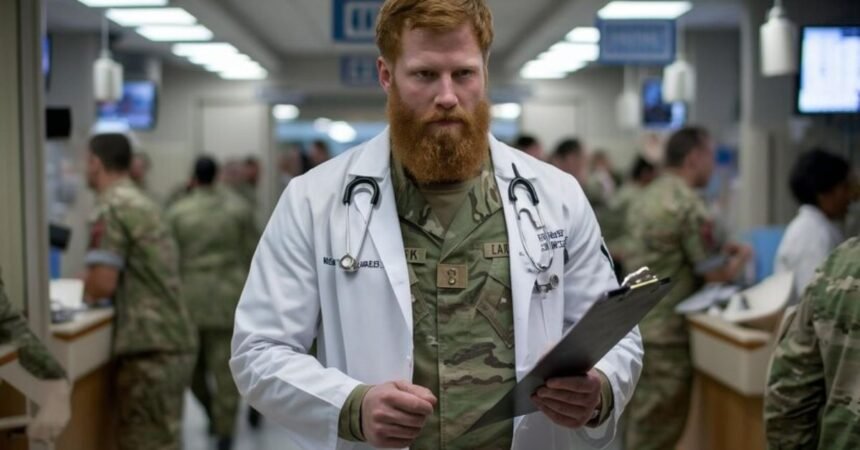Dr. Alfred Carlomagno, an esteemed Lieutenant Colonel (LTC) in the Army Reserve, has earned recognition for his expertise in both the medical and military fields. His dual roles as a medical professional and military leader exemplify the unique skill set required to maintain the health and readiness of military personnel while contributing to the civilian healthcare system. By understanding his contributions, we can appreciate the importance of medical professionals like Dr. Carlomagno in ensuring the success of military missions and providing high-quality care in challenging environments.
In this article, we will explore the key concepts related to Dr. Alfred Carlomagno’s role in the Army Reserve, the importance and benefits of medical officers in military settings, real-world applications of their work, and the challenges they face. Practical solutions for overcoming these challenges will also be discussed, along with a final summary of key takeaways.
Key Concepts Related to Dr Alfred Carlomagno LTC Army Reserve
Dr. Alfred Carlomagno exemplifies the qualities of a military medical officer, balancing leadership with medical expertise in the Army Reserve. His responsibilities extend beyond traditional medical practice, as he leads teams, trains personnel, and ensures the well-being of soldiers in diverse and challenging environments.
Who is Dr Alfred Carlomagno LTC Army Reserve?
Dr Alfred Carlomagno LTC Army Reserve in the U.S. Army Reserve, specializing in medical care for military personnel. With a distinguished background in both the medical and military fields, he brings valuable expertise to the military’s healthcare system. In addition to providing critical medical services during deployments, Dr. Carlomagno plays a leadership role, overseeing medical readiness, training, and strategic planning.
The Role of an LTC in the Army Reserve
A Lieutenant Colonel (LTC) holds a leadership position within the Army Reserve, typically overseeing operations, managing teams, and ensuring mission readiness. As an LTC, Dr. Carlomagno’s responsibilities include:
- Managing medical teams during deployments.
- Ensuring medical preparedness for soldiers.
- Coordinating healthcare logistics in combat and non-combat environments.
- Leading training sessions on medical procedures and health protocols.
His role involves both operational leadership and hands-on medical care, making him a key figure in maintaining troop health and readiness.
Importance and Benefits of Medical Officers in the Army Reserve
Medical officers like Dr Alfred Carlomagno LTC Army Reserve are essential to the success of military operations. Their role encompasses ensuring that soldiers are physically and mentally prepared for deployment, providing emergency medical care, and supporting long-term health initiatives.
Medical Readiness and Operational Health
The health of military personnel is critical to operational success. Medical officers are responsible for ensuring that soldiers are physically fit and medically prepared for the rigors of deployment. Dr. Carlomagno, as an LTC, leads efforts to assess and maintain the health of soldiers, ensuring they are ready for any mission.
Supporting Civilian and Military Health
Medical officers in the Army Reserve bring unique value because they serve in both civilian healthcare settings and military operations. This dual role allows professionals like Dr. Carlomagno to contribute their expertise to public health while also supporting military objectives. The transfer of knowledge between these sectors enriches both fields.
Rapid Response in Crisis Situations
In times of crisis, such as natural disasters or military conflicts, medical officers play a vital role in providing immediate care. Whether deployed to a combat zone or assisting in humanitarian relief efforts, Dr. Carlomagno’s expertise allows him to lead medical teams that respond quickly and effectively to emergencies, saving lives and mitigating health risks.
Leadership and Training
Beyond medical care, LTCs like Dr. Carlomagno are responsible for training and mentoring other healthcare professionals within the Army Reserve. Through leadership and knowledge-sharing, they ensure that medical teams are well-prepared to meet the challenges of military service, from combat trauma to mental health support.
Applications and Use Cases for Medical Officers in the Army Reserve
The work of medical officers in the Army Reserve has far-reaching applications, impacting both military and civilian populations. Below are practical examples of how Dr. Carlomagno’s expertise as an LTC and medical officer can be applied in various settings.
Combat Medical Care
During deployments, medical officers provide immediate care to soldiers injured in combat. Their expertise is critical in stabilizing injuries, preventing fatalities, and ensuring that soldiers receive the best possible care under difficult circumstances.
Case Study: Emergency Care in a Combat Zone
In a recent deployment, Dr. Carlomagno led a medical unit responsible for treating soldiers injured by IEDs (Improvised Explosive Devices). His leadership in triaging injuries and coordinating evacuations saved lives and ensured that injured personnel received timely treatment.
Disaster Relief and Humanitarian Aid
Army Reserve medical officers are frequently deployed to assist in disaster relief efforts. In these situations, they work with local healthcare providers and government agencies to deliver medical care to affected populations, often in remote or resource-limited settings.
Case Study: Earthquake Relief Mission
Following a major earthquake in a developing country, Dr. Carlomagno and his team were deployed to provide emergency medical care. By setting up mobile clinics and coordinating with local health workers, they were able to treat hundreds of patients, stabilize critical cases, and prevent disease outbreaks.
Mental Health Services for Soldiers
Mental health is a growing concern in the military, with many soldiers experiencing PTSD, depression, and anxiety following deployments. Medical officers like Dr. Carlomagno are key in providing mental health services, offering counseling, treatment, and ongoing support to soldiers and veterans.
Case Study: PTSD Support for Returning Soldiers
After returning from a particularly challenging deployment, several soldiers in Dr. Carlomagno’s unit began showing signs of PTSD. Dr. Carlomagno worked with mental health professionals to develop a comprehensive treatment plan, including counseling and therapy, which helped the soldiers manage their symptoms and reintegrate into civilian life.
Challenges Faced by Medical Officers in the Army Reserve
While medical officers like Dr. Alfred Carlomagno play an essential role in the Army Reserve, they face a unique set of challenges that require resilience and adaptability.
Balancing Civilian and Military Careers
Medical officers in the Army Reserve often have dual careers, balancing their civilian medical practices with military service. For someone like Dr. Carlomagno, this can be a demanding task, requiring careful time management and employer support to accommodate deployments and training.
Solution: Time Management and Flexible Scheduling
To overcome this challenge, medical officers work closely with their civilian employers to create flexible schedules that allow them to fulfill both their military and civilian duties. Additionally, time management skills are critical to ensuring that both careers receive the necessary attention.
Providing Medical Care in Austere Environments
During deployments, medical officers often work in environments with limited resources and infrastructure. Whether in a remote combat zone or an area affected by natural disasters, providing high-quality medical care under such conditions requires creativity and adaptability.
Solution: Training for Resourceful Care
Army Reserve medical officers receive specialized training in providing medical care with minimal resources. By learning how to improvise and make the most of available supplies, they are able to deliver effective care even in challenging environments.
Maintaining Readiness for Deployment
As members of the Army Reserve, medical officers must be ready to deploy at any time. This requires them to maintain physical fitness, keep up with medical training, and ensure that their personal and professional lives are in order for potential deployments.
Solution: Ongoing Training and Preparedness
Medical officers like Dr. Carlomagno participate in regular training exercises to maintain their readiness for deployment. This includes physical fitness tests, medical training, and leadership development courses to ensure they are fully prepared for the demands of military service.
Solutions for Overcoming Challenges in the Army Reserve
Medical officers like Dr. Alfred Carlomagno can overcome these challenges by implementing strategies that enhance both their professional and personal effectiveness.
Comprehensive Training Programs
The Army Reserve offers extensive training for medical officers to ensure they are prepared for the challenges of both combat and disaster relief missions. These programs cover everything from emergency medical care to leadership and team management, allowing medical officers to excel in any environment.
Building Strong Support Networks
Medical officers rely on strong support networks to balance their military and civilian responsibilities. This includes collaborating with colleagues, family, and employers to ensure they have the resources and support needed for successful deployment and reintegration.
Resilience and Mental Health Support
The demands of military service can take a toll on both physical and mental health. Army Reserve medical officers receive support through resilience training, counseling. Peer support groups, helping them manage the stress of deployments and maintain their well-being.
Conclusion
Dr. Alfred Carlomagno’s role as an LTC in the Army Reserve highlights. Critical importance of medical officers in maintaining the health, readiness, and effectiveness of military personnel. His expertise in both military and civilian healthcare demonstrates the value of dual-career professionals in bridging the gap between public health and military operations.
From providing life-saving care in combat zones to leading disaster relief efforts and supporting the mental health of soldiers. Medical officers like Dr. Carlomagno play an indispensable role in the Army Reserve. As military and humanitarian challenges continue to evolve, the contributions of medical professionals will remain essential to mission success.
For those interested in pursuing a career that combines medicine with military service. Dr. Carlomagno’s work serves as an inspiring example of the impact medical officers can make in both fields.
FAQs
1. What role does Dr. Alfred Carlomagno play in the Army Reserve?
Dr. Alfred Carlomagno serves as a Lieutenant Colonel (LTC) in the Army Reserve, providing medical care and leadership.
2. How do medical officers contribute to military readiness?
Medical officers ensure that soldiers are physically and mentally prepared for deployment and provide emergency medical care.
3. What challenges do medical officers in the Army Reserve face?
They often balance civilian careers with military duties and work in austere environments with limited resources.
4. How do medical officers maintain readiness for deployment?
Medical officers participate in regular training, maintain physical fitness, and stay up to date with medical practices.
5. How does the Army Reserve support the mental health of its officers?
The Army Reserve provides resilience training, counseling, and support networks to help officers manage the stress of service.




